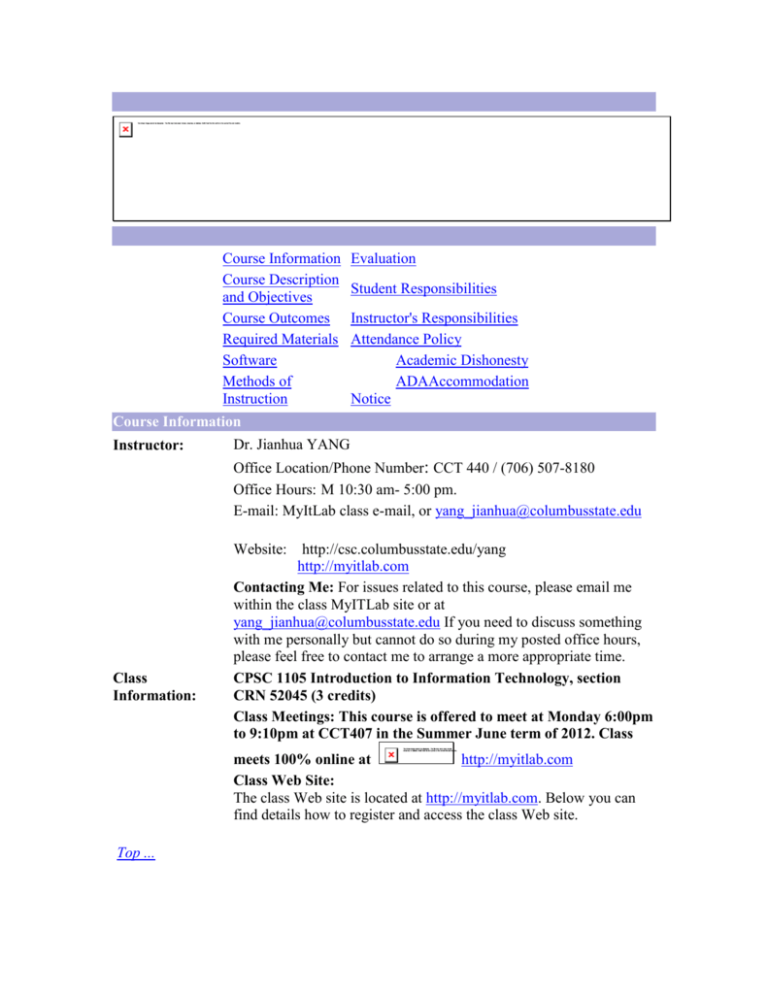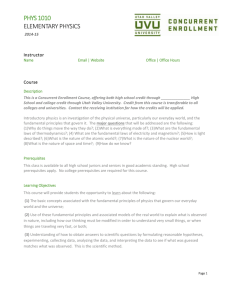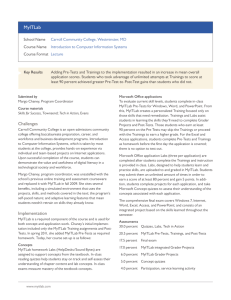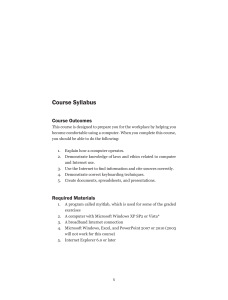CPSC 1105 - Yang
advertisement

Course Information Course Description and Objectives Course Outcomes Required Materials Software Methods of Instruction Evaluation Student Responsibilities Instructor's Responsibilities Attendance Policy Academic Dishonesty ADAAccommodation Notice Course Information Instructor: Dr. Jianhua YANG Office Location/Phone Number: CCT 440 / (706) 507-8180 Office Hours: M 10:30 am- 5:00 pm. E-mail: MyItLab class e-mail, or yang_jianhua@columbusstate.edu Website: Class Information: http://csc.columbusstate.edu/yang http://myitlab.com Contacting Me: For issues related to this course, please email me within the class MyITLab site or at yang_jianhua@columbusstate.edu If you need to discuss something with me personally but cannot do so during my posted office hours, please feel free to contact me to arrange a more appropriate time. CPSC 1105 Introduction to Information Technology, section CRN 52045 (3 credits) Class Meetings: This course is offered to meet at Monday 6:00pm to 9:10pm at CCT407 in the Summer June term of 2012. Class meets 100% online at http://myitlab.com Class Web Site: The class Web site is located at http://myitlab.com. Below you can find details how to register and access the class Web site. Top ... Course Description and Objectives Course Description: Course Objectives: Prerequisites: None This course provides an introduction to computer and information technologies. It discusses the nature of information, computer hardware, software, communications technology, and computerbased information systems. The theory is complemented by practical work aimed at gaining basic proficiency with different types of widely used application software. (3 credits). University Requirement: This course satisfies the University requirement regarding communication technology skills. Upon completion of this course, students will demonstrate an appreciation of the role of information technology in modern society. They will be familiar with the principal components of computer hardware and the functions of different types of software that make computers useful in daily life. They will demonstrate a basic understanding of the processes involved in the development of software for problem solving, and the life cycle of information systems. Students will be introduced to modern data communication technology including the Internet and the World Wide Web. They will be aware of various issues related to computer security and privacy. Students will obtain basic practical skills necessary for manipulating and presenting information in a productive way. Software packages used will deal with word processing, spreadsheets, presentation graphics, databases and Web page creation. Top ... Course Outcomes Students will demonstrate an understanding of the role of information technology. o Strategies and Actions used to produce the outcome: Study the application of information technology in everyday life. Class discussion about what an information system is, and aspects of information technology. o Assessment Methods: Written Assignments, Quizzes, and Exams. Students will demonstrate knowledge of the main components of a computer system. o Strategies and Actions used to produce the outcome: Study different types of hardware components such as the CPU, memory and input/output devices. Class discussion of how different hardware components work together and, with system software, make a computer system operational. o Assessment Methods: Written Assignments, Quizzes, and Exams. Students will demonstrate familiarity with and basic proficiency in popular application packages such as Microsoft Word, PowerPoint, Excel, and Access. o Strategies and Actions used to produce the outcome: Study the application of different types of software applications Supervised laboratory sessions for gaining hands-on experience with using common application packages. o Assessment Methods: Written and Practical Assignments, Quizzes, Labs, and Exams. Students will demonstrate knowledge of the use of programming languages and the process of software development. o Strategies and Actions used to produce the outcome: Study of the concepts of computer programming and the use of programming languages, algorithms, compilers. Classroom discussion and hands-on experience of computer programming using a user-friendly programming environment. o Assessment Methods: Written Assignments, Quizzes, and Exams. Students will be familiar with the concepts and technology used in modern computer networks including the Internet. o Strategies and Actions used to produce the outcome: Study concepts of data communication technology. Classroom discussion of how computer networks are constructed and how they enable communication of information. o Assessment Methods: Written Assignments, Quizzes, and Exams. Students will demonstrate awareness of possible threats to computer security and how information can be protected. o Strategies and Actions used to produce the outcome: Study various types of security threats and protection mechanisms. Classroom discussion of computer security and relevant tools. o Assessment Methods: Written Assignments, Quizzes, and Exams. Top ... Required Materials All class materials with this course are available on the class MyITLab Web site( http://myitlab.com ). It includes e-text, slides, audio-videos, online quizzes, assignments, simulation software with trainings and tests, and online midterm and final exams. Title: Technology In Action, Complete, 8th edition Authors: Evans, Martin, Poatsy Publisher: Prentice Hall Copyright: 2012 Published: 2011 The book is available as e-text when you register on MyITLab and enroll in the course. This course is being provided through the use of MyITLab. You can access MyITLab at: http://www.myitlab.com/ You can register and enroll in CPSC 1105 Introduction to Information Technology in two ways: Register and enroll in the class directly on the http://myitlab.com Register and enroll in the class on http://myitlab.com with an access code purchased from the CSU bookstore The purchase cost (online or with access code) is $110. Top ... Software Software To complete all lessons, quizzes, assignments, trainings, tests, and exams, you will need a computer with access to: Internet Windows XP/Vista/7 Internet Explorer browser Microsoft Office 2010 (Word, Excel, PowerPoint, Access) Access to our class site at MyITLab Top ... Methods of Instruction Methods of Instruction: Class presentations Quizzes Assignments Trainings Tests Midterm and Final Exams Lessons The CPSC 1105 class presentations are based on online e-text chapters readings, review of slides and audio-videos. The topics covered in the class follow the course schedule. Each student is expected to come to Monday class, complete all class lessons, read the textbook chapters, review the slides and listen to the audio-videos, making notes. The students have to complete the online end of chapter self-tests as preparation for the chapter quizzes. All chapter readings with slide reviews, audio-videos and end-of-chapter self-tests are assigned and have to be completed within two class session (only Chapter 1, slides, audio-video, and end-of-chapter self-test is assigned for one session). Quizzes Thirteen (one per a chapter) are scheduled. The quizzes are open textbook. You can attempt a quiz up to three times. The highest score will count. The quizzes are open until midnight at the due date. The quizzes consist of multiple-choice, fill-in blank, matching, and true-false questions covering topics from the textbook chapters. You can take a quiz earlier but not later the deadline. All due dates and times of the quizzes are firm. Assignments Six assignments are scheduled and will be graded. Four of the assignments are with MS Office 2010 (using Word, Excel, PowerPoint, and Access) and two assignments are with the textbook topics - create a blog and download, install, and use software from Internet. The assignments activities as designing and developing Word documents, PowerPoint presentations, electronic spreadsheets, and Access databases cannot be learned simply by reading a textbook. You must practice, practice, and practice to develop skills how to design, develop, and solve technological problems using computer applications. Late assignments are not accepted for credits. See the Schedule and Assignment areas of the class Web site for details. Trainings The trainings are skill development and learning tools. They are based on the MyITLab simulation environment where your are practicing with scheduled set of activities. Five training are scheduled and available on the class Web site at MyITLab - Windows 7, MS Office 2010 Word, Excel, PowerPoint, and Access. Multiple training sessions are scheduled to complete and repeat the task of the trainings. The trainings will not be graded. You have to use them in preparation for the tests. For details how to work with MyITLab simulation environment and do trainings, go to the How To.. Web page , open and listen to the audio-video Explore MyITLab Office Simulation. Tests Five tests are scheduled on the MyITLab ( http://myitlab.com ) simulation environment. The tests are for Windows 7, Microsoft Office 2010 MS Word, Excel, PowerPoint, and Access. The tests are timed and will be graded. They allow to measure your proficiency and skills in the test topics. All due dates and times of the tests are firm. You cannot take a test after the deadline. For details how to work with MyITLab simulation environment and take a test, go to the How To.. Web page , open and listen to the audiovideo Explore MyITLab Office Simulation. Exams Your performance in this class will be measured by two exams - Midterm and Final Exam. No make up exams will be given unless an exam was missed due to a documented emergency. Questions on the Midterm and Final exams may include the following: problem-solving, short essay questions, multiple choice, matching, filling-in blanks. The questions are from the textbook topics. Some of the questions are similar to the questions in the chapter quizzes. The Midterm Exam is a take-home, online exam delivered through MyITLab. The Final Exam will be in-class, proctored exam. See the class Schedule for the exam date, time and location. If you cannot take the Final Exam inclass, you have to contact me not later than Wednesday, July 18th with your decision. Top ... Evaluation The final grade will be obtained from the following: 50% (Midterm: 20%, Final: 30%) Skill Tests 5 20% Assignments 6 10% Quizzes 13 20% Exams 2 The letter grade will be assigned as follows: Grade A B C D F Points 90-100 80-89 70-79 60-69 0 -59 All grades will be posted on the class MyITLab site. Top ... Student Responsibilities As a student in this course, you are responsible to: manage your time and maintain the discipline required to meet the course requirements, come to class prepared to ask questions to maximize your understanding of the material, complete all readings, complete all assignments, complete all quizzes, tests, and exams, actively participate in discussions, read any e-mail sent by the instructor and respond accordingly. "I didn't know" is NOT an acceptable excuse for failing to meet the course requirements. If you fail to meet your responsibilities, you do so at your own risk. Top ... Instructor's Responsibilities As your instructor in this course, I am responsible to: lead the class discussion and answer student's questions, post weekly lessons outlining the assignments for the week, read all responses to discussion questions and comments to responses, actively participate in discussions when necessary, grade assignments, quizzes, and exams, and post scores within one week of the end of the week in which they are submitted, and read any e-mail sent by the you and respond accordingly within 24 hours. Top ... Attendance Policy Class attendance is the responsibility of the student, and it is the student's responsibility to independently cover any materials missed. Class attendance and participation may also be used in determining grades. It is your responsibility to sign a roll sheet for every class meeting. At my discretion, I may drop you from the course for more than 6 absences. Missing an exam or quiz is considered an absence. Missed classes caused by participation in documented, formal, University-sponsored events will not count as absences provided you notify me of such anticipated absences in advance and as soon as possible. You are responsible for all class work missed, regardless of the reason for the absence(s). Late assignments will not be accepted, so if you are absent on the day an assignment is due, it is your responsibility to make alternate arrangements. No makeup exams or quizzes will be given, so please make sure you are present for all exams/quizzes. Refer to the CSU Catalog ( http://ace.columbusstate.edu/advising/a.php#AttendancePolicy ) for more information on class attendance and withdrawal. Top ... Academic Dishonesty Academic Dishonesty: Academic dishonesty includes, but is not limited to, activities such as cheating and plagiarism (http://ace.columbusstate.edu/advising/a.php#AcademicDishonestyAcademicMisconduct ).It is a basis for disciplinary action. Any work turned in for individual credit must be entirely the work of the student submitting the work. All work must be your own. You may share ideas but submitting identical assignments (for example) will be considered cheating. You may discuss the material in the course and help one another; however, any work you hand in for a grade must be your own. A simple way to avoid inadvertent plagiarism is to talk about the assignments, but don't read each other's work or write solutions together unless otherwise directed. For your own protection, keep scratch paper and old versions of assignments to establish ownership, until after the assignment has been graded and returned to you. If you have any questions about this, please see me immediately. For assignments, access to notes, the course textbooks, books and other publications is allowed. All work that is not your own, MUST be properly cited. This includes any material found on the Internet. Stealing or giving or receiving any code, diagrams, drawings, text or designs from another person (CSU or non-CSU, including the Internet) is not allowed. Having access to another person's work on the computer system or giving access to your work to another person is not allowed. It is your responsibility to keep your work confidential. No cheating in any form will be tolerated. Penalties for academic dishonesty may include: a zero grade on the assignment or exam/quiz a failing grade for the course suspension from the Computer Science program dismissal from the Computer Science program. All instances of cheating will be documented in writing with a copy placed in the Department's files. Students will be expected to discuss the academic misconduct with the faculty members and the chairperson. For more details see the Student Handbook:http://ace.columbusstate.edu/advising/a.php#AbsencePolicy. Getting help Student assistants in the Computer Center can help you with basic computer-related problems such as logging on to the network, saving your work, etc., but they are not obligated to help you with your assignments. There are several tutors at the Department of Computer Science CCT 450 Lab, who can help you with the assignments. Their schedule is posted in the Computer Science department site. You can also always contact me during my posted office hours, by e-mail, or by appointment. Top ... ADA Accommodation Notice CSU ADA statement If you have a documented disability, as described by the Rehabilitation Act of1973 (P.L. 933-112 Section 504) and the Americans with Disabilities Act (ADA)and subsequent amendments and would like to request academic and/or physical accommodations, please contact the Office of Disability Services in the Schuster Student Success Center (room 221), 706-507-8755, as soon as possible. Course requirements will not be waived, but reasonable accommodations may be provided as appropriate. Top ...









